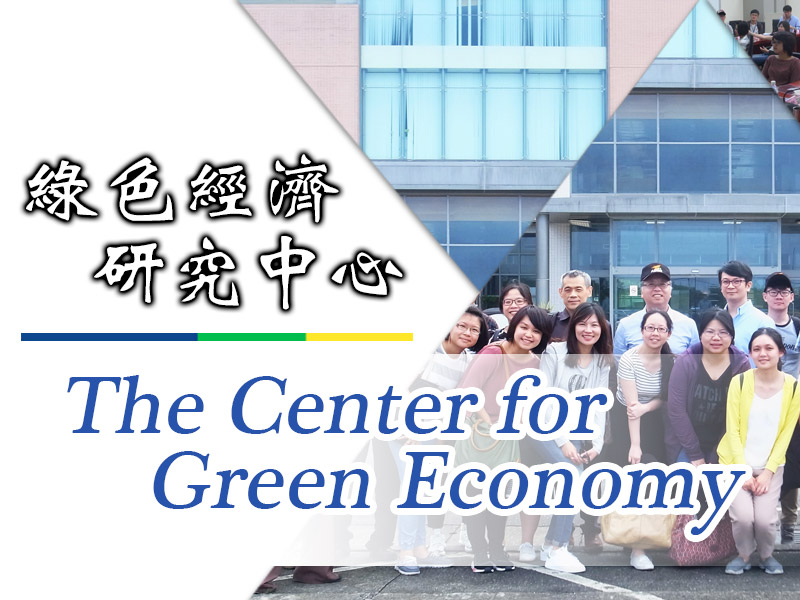綠色經濟研究中心
設立宗旨
根據2019年世界經濟論壇所出版的全球風險報告,排名前十位中,有六項的風險都與環境極端氣候息息相關,永續發展成為各界的期待,且已是刻不容緩的事!因此,各國政府與民間組織陸續提出多種生產及消費的物質流、金流及資訊流等模式,期待藉由經濟轉型,完成環境好、經濟也好的目標。其中,「綠色經濟」就是著眼地球資源有限所應運而生的經濟發展理念,在產品與服務的生產、消費與廢棄各階段中,透過創新的科技、商業模式與生活型態,完成永續發展目標下的經濟轉型。
臺灣各界亦體認此經濟發展模式的重要性,除政府將綠色經濟發展明列為重要的國家發展政策之外,民間亦積極將綠色經濟理念轉化為實際可行的經濟模式;而為了有效達到對物質流、金流及資訊流的精準掌握與運用,更需要各行各業傾力支持,提供創新性的教育、法規、科技、以及管理等新思維和作法,轉化臺灣綠色經濟商業模式,提升國家競爭力。
研究方向及目標
本中心為全方位之綠色經濟研究單位,研究課題包含綠色貿易、綠色經濟、再生能源、環保政策、循環經濟、氣候變遷、綠色金融、資源回收。另為有效推進臺灣各類生產及消費的多樣綠色經濟商業模式,綠色經濟研究中心結合產官學界共同推動下列工作:
- 強化國內外跨界合作與夥伴關係:包含常態性產官學對話機制、異業結盟、國內外交流與夥伴關係建立。
- 教育宣導與凝聚各界共識:包含青年學生意識建立、媒體溝通、產業工作坊、產業策略討論等。
- 共同研發技術方案:包含回收再利用技術、物聯網技術、智慧物流系統、生產製程、數據資料庫等。
- 研擬相關法令措施:包含國家目標、各政府層級政策、產品與服務標準、認證機制、民生法規等。
- 提升公司環境社會制理(ESG)層次與競爭力:包含企業內部管理制度、對外永續發展責任延伸等。
- 精進創新型的商業模式:包含公私夥伴關係、民生消費型態、工業生產鏈結等。
人員簡介
| 姓名 | 職稱 | 最高學歷 | 研究領域 |
|---|---|---|---|
| 溫麗琪 |
|
美國康乃狄克大學經濟學博士 | 環境經濟學 法律經濟學 公共經濟學 應用計量經濟學 應用個體經濟學 |
| 劉哲良 |
|
國立台灣大學農業經濟所博士(主修「資源環境經濟」與「生產管理經濟」) | 環境與資源經濟 成本效益分析 經濟影響分析 環境外部成本 環境成效貨幣化 非市場價值評估 環境政策評估 環境稅費分析 臺灣碳定價 |
| 林俊旭 |
|
美國華盛頓州立大學環境與自然資源科學博士 | 資源回收 土壤沖蝕模式 環境規劃 |
| 陳中舜 |
|
國立台北科技大學機電研究所(Department of Mechanical Engineering)博士 | 能源安全 能源經濟 工程熱力學 |
| 張軒瑜 |
|
||
| 葉長城 |
|
國立政治大學政治學系博士 | 政治經濟學 比較政治經濟學 國際政治經濟學 發展中國家政治 亞太與拉丁美洲區域政治及經濟 國際關係 媒介與政治 貿易與環境 |
| 廖林詮 |
|
||
| 薛翔之 |
|
||
| 李盈嬌 |
|
國立台灣大學數學所碩士 | 公共政策研究與分析 環境經濟 產業經濟 |
| 林宗昱 |
|
台灣大學農業經濟研究所碩士 | 環境經濟 資源回收 經濟影響評估 |
| 周雨蓁 |
|
聯絡方式
綠色經濟研究中心 電話:(02)2735-6006 分機5066; 傳真:(02)2739-6835; 本中心網站:http://www.ciercge.org.tw/


